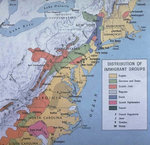So that's where it came from!? Thought we stole it from the Indians. Turns out it was the Canadians. Who woulda thunk it?
I live almost exactly between the Brandywine Battlefield and Valley Forge. Not quite in Lancaster County (about a county away) but close enough to say, "PB, Dude, Your ancestors blew it."
I live almost exactly between the Brandywine Battlefield and Valley Forge. Not quite in Lancaster County (about a county away) but close enough to say, "PB, Dude, Your ancestors blew it."

